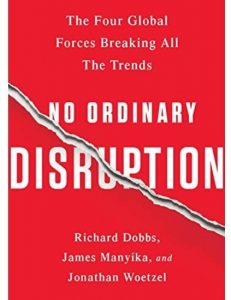Global Forces of Digital Disruption
Display Transcript
What is disruption? Disruption can be described as “interrupting the normal course or unity of.” In the business world, this word is synonymous with the idea of innovation. Every year large companies such as Samsung and Apple are competing with smaller start up companies that are attempting to disrupt a particular industry and gain market share. Recent examples of this are companies like Uber and Air B&B. We are used to these disruptions and even larger ones that have a great effect on the industry as a whole, but what happens when this transformation is taken a step further? What happens when an idea can disrupt not only the particular industry, but the economy as a whole? This is what is happening around us today as the world economy is entering a new, post-modern, Digital Age.
The book, No Ordinary Disruption: The Four Global Forces Breaking all the Trends by Richard Dobbs, James Manyika, and Jonathan Woetzel explores several key reasons why the digital revolution is happening all around us and why it will be a change that we have never seen before.
The opening of the book encourages readers to “Reset Your Intuition”. We used to live in a world where a company would institute massive change that would eventually lead to an era of steady profitability. This is no longer the case. Companies are no longer able to make meaningful change every decade or even every 5 years. We live in a world of constant change and perpetual discontinuity. There is no way to stay stagnant. Companies are either driving change or are simply left behind.
This new reality is a result of several key forces, first of which being the rise of emerging markets. Over the past century, the population has been exploding all over the world, but particularly in Asia. The economic center of gravity has shifted from Europe in the early 1900s to Asia. Along with the population explosion comes the building of new, and increasingly impressive cities. The McKinsey Global Institute estimates that 46 of the top 200 largest global cities will be in China by 2025. To survive this shift, companies must also be willing to constantly shift their business to these new markets as they arise, something that has not been possible before the digital era.
The next key factor is accelerating technological change. A key example of this is Moore’s Law which states that processing speed doubles every 1-2 years. With this technology and the amount of data that companies are not only able to collect but process, there is no limit to the number of ideas companies could implement to drive meaningful change. Consumers are willing to adopt new technology faster than ever before which makes markets full of potential consumers.
The third key factor to the idea of Digital Transformation is the aging world population. The birth rates in many countries continue to go down, especially in the United States. Even India, the country with the highest fertility rate, has seen decline of about 60% in the past fifty years. This coupled with the population booms of the 1950’s has led to an overall aging of the workforce. Shortly more and more of these individuals will no longer be in the workforce and we will face significant shortages in labor. There is a need for technology to fill this gap to ensure that economies can continue to grow.
The final key factor is globalization. Increased global trade has allowed many companies to reach new consumers internationally. This will be a key driving force as large companies fight to make their mark on the global economy. People are also a major factor in globalization. More and more individuals from around the world are coming together to form increasingly diverse, global teams that will better suited to tackle the problems of tomorrow.
To close, let me reemphasize the overarching idea behind all these factors. Change is the new norm. The world will soon be filled with companies who have changed their industry and not changed because of their industry. Who should we be to be better prepared for this future? The answer is simple. We should be the individuals driving industry change, whilst inspiring a similar change in ourselves. Thank You.

No Ordinary Disruption by Richard Dobbs, James Manyika, and Jonathan Woetzel explores four global forces that are “breaking all the trends”. The authors explain how the forces of emerging markets, accelerating technological impact, an aging world population, and globalization will shape our modern economy, providing opportunity for some and great risk for others. In addition to presenting the forces, the authors encourage the readers to “reset their intuition”. Most of what has been previously learned from schooling or experience is no longer applicable to the digital world of tomorrow. All of these claims are supported by extensive research from the McKinsey Global Institute.
This book has offered a meaningful look to the global economy of tomorrow and encouraged me to focus on the big picture, particularly in my education. This has caused me to focus more on concepts and problem solving than brute memorization. These skills will be much more useful as I progress in my career and face the uncertainty of tomorrow. My newly developed intuition will be my guide as I navigate into the future.

Cameron Free
Member of Cohort 7 of the Lockheed Martin Leadership Institute
View Biography
Cameron Free is a Manufacturing Engineering Major and Business Management Minor at Miami University graduating in Spring 2020. Cameron is extremely passionate about personal development and is pursuing opportunities to gain further industry experience. He is currently focusing on his personal development through his membership in the 7th Cohort of the Lockheed Martin Leadership Institute. In the Institute, Cameron is currently collaborating with his peers and leading a team to complete a unique project focused on Digital Transformation. The primary focus of the team is to create 5 to 7-minute videos centered on the topic of Digital Transformation and to address all the technical needs of visiting executive speakers. This project has allowed Cameron to exercise his passion for productivity and desire for simplicity in a dynamic, team-based working environment.
In addition to academic and professional pursuits, Cameron is also very involved in public service and personal development in a local campus ministry. This involvement has created several unique mentoring relationships with adults and other college students alike.
